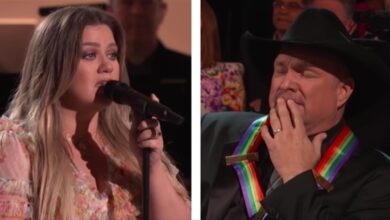At 67, Jeannie C. Riley Proves Her Charm Remains Unchanged With “Harper Valley PTA”
Jeannie C. Riley’s influence on the country music genre is profound and multifaceted. Rising from her humble beginnings in Stamford, Texas, she has become a forerunner for women in a field historically dominated by male voices. With the release of “Harper Valley PTA” in 1968, she not only captivated audiences but also made significant strides for female representation within the music industry. The song, which took the top spot on both the Billboard Hot Country Songs and Hot 100 charts, became a cultural phenomenon, marking a pivotal moment in the evolution of country music and women’s roles in it.
Riley’s musical journey began in a household where music was cherished and celebrated. This nurturing environment instilled in her a passion for singing and songwriting, which she carried with her through the ups and downs of her early career. The 1960s, characterized by social upheaval and a reexamination of traditional roles, provided fertile ground for Riley’s emergence. As she ventured to Nashville, she became part of a vibrant music scene where many artists chased their dreams, and despite facing numerous challenges, she remained steadfast in her pursuit of success.
The narrative woven through “Harper Valley PTA” is a powerful critique of social conventions. Written by the talented Tom T. Hall, the song tells the story of Mrs. Johnson, a mother confronting the moralistic standards imposed by her community’s PTA. This storyline resonates with universal themes of defiance and empowerment, echoing the frustrations of countless women grappling with societal expectations. Jeannie C. Riley’s compelling interpretation of this narrative gave voice to these shared experiences, turning the song into an anthem for a generation seeking equality and validation in a world that often dismissed them.
Riley’s artistry was not only about the songs she sang but also about the vibrant energy she brought to her performances. Her voice, marked by authenticity and emotional depth, captivated audiences and established her as a dynamic entertainer. “Harper Valley PTA” was not merely a hit; it was a rallying cry that encouraged women to stand up for their beliefs and challenge the status quo. This success catapulted Riley into a new realm of visibility, making her a recognized figure in American music and beyond.
As her career progressed, Riley demonstrated a remarkable ability to embrace diverse musical influences. She ventured into various styles, including gospel and pop, showcasing her versatility and willingness to experiment beyond the confines of traditional country music. This adaptability was crucial as the industry evolved through the decades, allowing her to maintain relevance while remaining true to the characteristics that defined her as an artist. The ability to navigate change while preserving the essence of her identity is a testament to her resilience and dedication.
The pressures of fame, however, were not without their tolls. Riley faced numerous personal challenges amidst the glamour of stardom, grappling with the complexities that often accompany a public life. Striking a balance between her professional persona and personal identity required considerable strength and self-awareness. Her journey highlights the intricacies faced by many female entertainers, showcasing a narrative of perseverance amid adversity. Despite her challenges, Riley’s unwavering spirit and commitment to her craft allowed her to thrive in an ever-changing musical landscape.
Years later, during her performance on New Year’s Eve in 2012, Riley proved that her artistry remained vibrant and engaging. Her performance drew applause not just for nostalgia but for the sheer joy she exuded on stage. Fans, both old and new, recognized her ability to connect with audiences across generations, reaffirming her status as a timeless entertainer. Comments from viewers reflected a shared admiration for her enduring talent, illustrating how her music continues to resonate long after its original release.
Reflecting on her legacy, Riley recognizes the significant impact she has had on future generations of women in music. Her path has inspired a myriad of female artists to pursue their dreams, emboldening them to express their stories and experiences through song. Today’s country music landscape is enriched by the contributions of women, many of whom stand on the shoulders of trailblazers like Riley, who dared to push boundaries and challenge the norms of their time.
Beyond her chart-topping hits, Riley’s music encompasses a wide array of themes and storytelling that resonate across cultural contexts. Her lyrical content often reflects the struggles and triumphs of everyday life, grounding her artistry in authenticity. This relatability ensures that her work remains relevant, continuing to attract a diverse audience eager to explore the narratives embedded in her songs.
Ultimately, Jeannie C. Riley’s career is a poignant reminder of the transformative power of music. Her journey from a small-town girl to an acclaimed artist is a source of inspiration for countless individuals, illustrating the potential for personal and cultural change through creativity. As she continues to perform and foster connections with her audience, Riley’s significant impact on country music and its evolving narrative remains indelibly rooted in the fabric of American musical history. Through her resilience and artistry, she has become not just a musician but a cultural icon whose legacy will likely influence and motivate generations to come.





